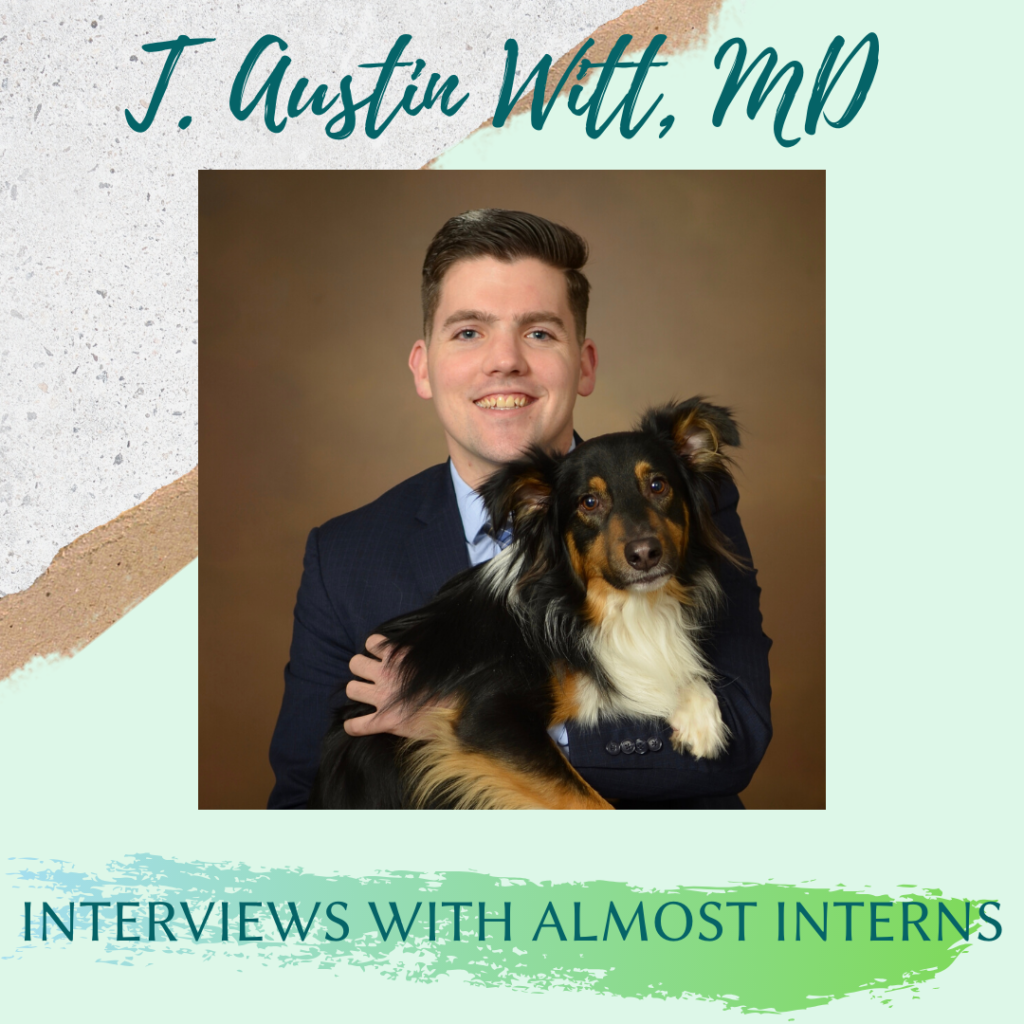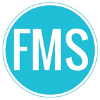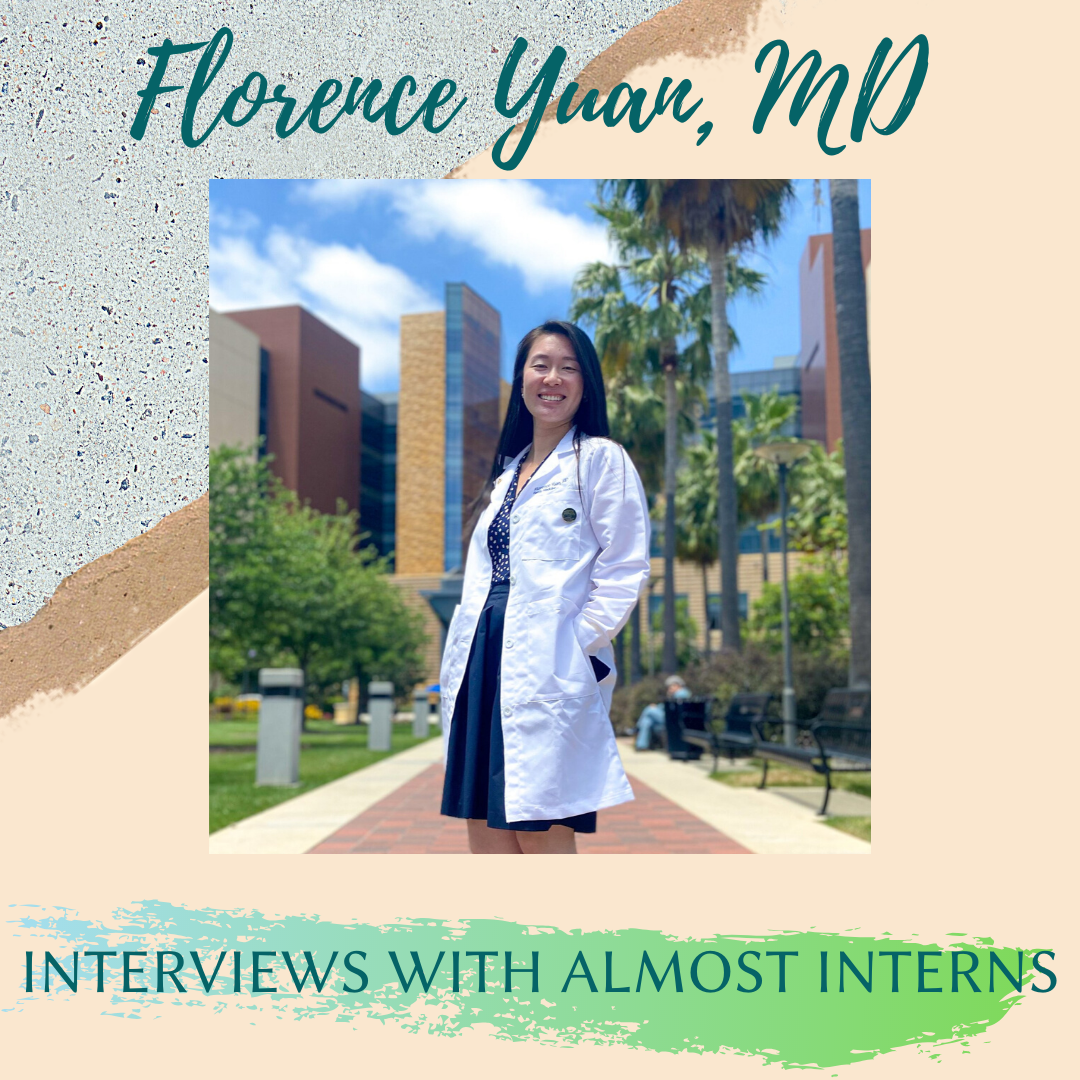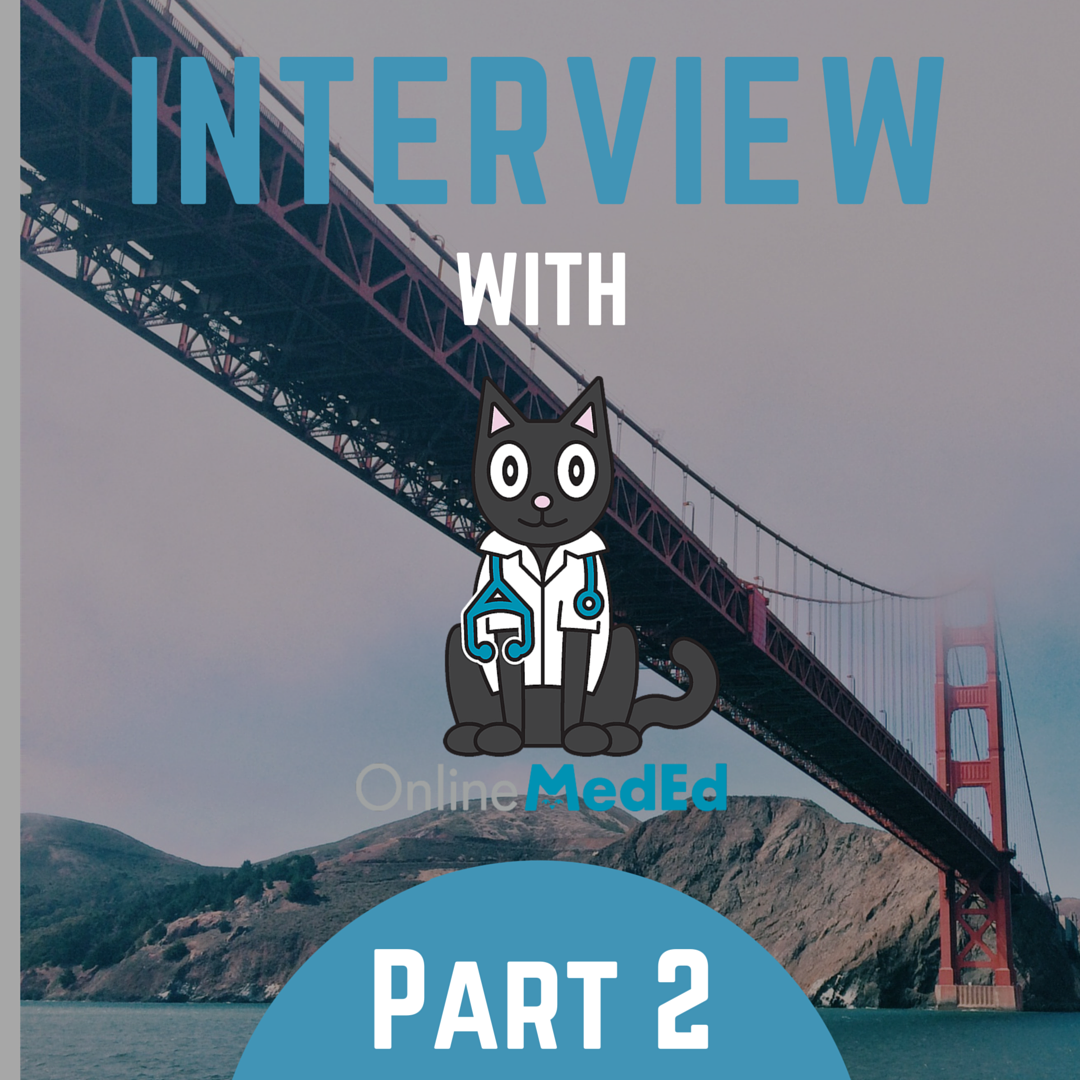Interview: Dr. Witt

This is part of a series of interviews with current PGY1s, done during May and June 2020, asking their thoughts about residency application, interviewing and Match. We hope this is helpful to the current #Match2021 applicants, despite all the differences of applying during a pandemic.
What’s your elevator pitch?
I am the son of a bank teller and an electrician, a first-generation college and medical student from the hills of East Tennessee. I have an undergraduate degree in biochemistry and cellular/molecular biology from the University of Tennessee. I took a brief detour through College Station, TX after undergrad when I thought I was going to do translational research on mitochondrial disease or novel pharmaceutical development in the Biochemistry/Biophysics department at Texas A&M University. I quickly came to the realization that as much as I love science and working with my hands, my real passion is caring for people and communities.
Why Family Medicine?
Family Medicine was always my choice. They actually made us list our top 3 specialties the week of orientation and include one specialty I would never do. Family Medicine was #1 and I knew even before school I never wanted to be a surgeon. I knew I wanted to do primary care, because of the desire to care for individuals on a one-on-one as well as community level.
Once I got to medical school, I immediately fell in love with our department. Our Chair of Family Medicine, Dr. Reid Blackwelder, is a past AAFP president and is one of the best educators/mentors at our school. All students love him regardless of their specialty. Once he learned I was interested in FM he immediately became my greatest mentor. He pushed me to get involved at my school, in our state academy, as well as at the national level through the AAFP. Thanks to him, I got to see just what is meant by FM being the “specialty of breadth”.
I was introduced to all kinds of family docs with all kinds of lifestyles and career types. The variability and uniqueness of every career in FM made me really excited that I could look forward to a dynamic professional life that could grow with me as I advance in my career and my community’s needs evolve.
Were you advised against FM?
No, not really. Our school is very friendly to Family Medicine. We have three programs and are involved with several rural sites across the region. The only push-back I ever got was from residents in other specialties on rotations that always came for me with the same tired argument of “Why would you do that? You won’t make any money! Why not do internal medicine??”
I told them that after growing up in a primarily single parent and working class household, even just resident pay would seem like a fortune. Some people just have different priorities you know? Attendings, however, always said they thought my choice aligned with my passions and goals.
What would you say to medical students still trying to choose between FM and another path?
I would ask them to do a lot of reflection on just what kind of doctor they want to be. Will choosing a specialty that lends itself to specialization allow you to scratch all the personal and professional itches you have? Are the people you meet in that specialty of the same heart and mind about medicine as you are? Those were the two biggest questions I had to ask myself.
I knew I wanted a specialty that would prepare me to fit any needs a community could possibly have, I had no desire to work surgical hours because I want to be able to advocate and work in my community outside of the exam room, and I wanted a specialty that was dedicated to improving the state of health care in the US at the highest levels to achieve an equitable level of health for all people through social justice in the field of medicine. Family Medicine was the only place where all of those motivations coexisted for me.
How did you narrow down programs to apply to?
I had a long list of programs that I had already explored significantly thanks to attending the AAFP National Conference for the last three years. They were all over the country and offered various benefits of training from OB heavy programs (with the ability to learn C-section skills) to community based programs working with the most under-served and vulnerable populations.
The first filter I applied to the list was geographical. As many awesome programs as there are on the West Coast, it was just too hard to get back to rural East Tennessee and my family from there; so I drew a westward boundary at Chicago.
Next, I had to really drill down on my clinical and professional interests. I knew I wanted an in-depth outpatient experience with patients of all ages and clinical concerns. I wanted to get trained in emerging primary care topics such as outpatient substance use disorder treatment, reproductive health, HIV primary care, and gender-affirming care. Fellowships were not of particular interest to me because I didn’t see myself sub-specializing. I want to keep my training as broad and flexible as possible.
At this point in my career, I desire to teach students and residents so I wanted a program at an institution that supports their Family Medicine department in leadership throughout the institution. It had to allow me opportunities to cultivate the academic part of my brain through education, research, and professional development.
Did anything complicate your interview process?
No not really, outside of the usual financial stress of the travel and living out of a suitcase. I was very lucky to get my preferred interview dates at the places furthest away, so I didn’t have to make redundant trips.
How many programs did you apply to? How many interviews did you have and did you rank them all?
I applied to 14, interviewed at 12 and ultimately ranked 10.
Are you considering future training (beyond residency) or considering a fellowship?
I have a lot of interests that could lend itself to doing some additional training, but I don’t think I’ll do a true fellowship. Since I want to be a health care leader in the community and the academic world, I can easily see myself getting another degree. I’ve thought about getting an MPH in Environmental Health. Growing up in rural Tennessee, we have a lot of natural resources (labor included) that are exploited by large corporations and I want to be able to advocate for my patients, their physical environment and the impact of their occupations on their health.
I have also thought about pursuing an MBA in order to better prepare me to lead the charge with health care reform. And then in another reality I could see myself doing some type of training at the Robert Graham Center to better understand how to affect change in federal policy as we push for a larger emphasis on primary care in the US.
What is your new AAFP role, and how did the official photo with your dog happen?
This year, I am the Student Representative to the AAFP’s Commission on Membership and Member Services. It is the commission that helps to improve how the AAFP recruits, retains, and serves its constituent members. I was interested in working with this group because I wanted to advocate for the increased representation of minority voices in our academy.
As far as the picture, our school actually has a professional photographer that does our ERAS headshots and regalia pictures for us at the beginning of our fourth year. After getting to know our AAFP staff in charge of the directory, I thought they might get a kick out of it. They ran with it and next thing I know, Chance is the face of the AAFP student leadership.
Imagining your post-residency self are you considering academic, rural or urban practice? Full spectrum or multi-spectrum, tell us what professional life looks like in five years!
If I were to script it, I would love to join faculty at one of the academic institutions here in Tennessee – so I can focus on leveraging the resources of academic medicine to innovate the care of vulnerable populations in my home region. It would also allow to have the robust outpatient clinic I desire while still getting to do enough hospital medicine to keep things spicy.
I have worked with the AAMC on the Organization of Student Representatives National Administrative Board for the last two years. Through that work, I have developed a passion for student affairs and medical education; so any opportunity to work with students to develop diverse and progressive learning environments would be a dream.
As far as the urban/rural distinction, the cool thing about East Tennessee is you go from one to the other extremely quickly. My hometown has a population of about 3,000 people with only a small outpatient family practice, but a lot of people drive the almost 45 minutes to Knoxville where the university medical center is to get their care. Knoxville is much larger with a much more diverse patient population. In my opinion, working towards health equity in this region requires the knowledge of both cultures.
How has COVID-19 affected your medical school experience, graduation and moving for residency plans?
COVID-19 really hit a fever pitch when I only had a few ER shifts left. I had already completed all of my Step exams, so from a work standpoint I was hardly affected. Where it really changed things was the end of school celebrations that everyone looked forward to. We had to do Match Day celebrations apart from all of our friends and classmates. Our graduation was done over Zoom. All the fun free time we had looked forward to as M4s was now devoted solely to flattening the curve. Vacations, concerts, and nights out were all cancelled.
I am not sure the weight of those things have truly sunk in for me yet. It is hard to grasp that I may have hugged some of those friends for the last time in a painfully long time. I had to obtain housing in Durham from five hours away in Tennessee completely sight unseen. It has been a crazy time, but I have tried to make the best of it by saving Hyrule on the N64 and working through the mound of unread books on my shelf.
Your parents did a Hogwarts graduation for you, so what House are you in, and how does it relate to choosing Family Medicine?*
Yes, my sister and mother put a Hogwarts Match Day together for me in under 48 hours, because our school was still exploring options for us to do an asynchronous live event for students until the last minute before ultimately cancelling. Like most kids I grew up identifying as a Gryffindor (because who doesn’t want to be brave and daring?) but as I grew older I slowly began to accept the fact that I am indeed a Ravenclaw. I love to learn and always considered “wit beyond measure as my greatest treasure”. The most shocking thing was that I had a not insignificant percentage of Hufflepuff in my Pottermore results. So, I tell most people I’m a Ravenpuff. I’m not sure it gave me any predisposition to choosing Family Medicine, I think there is space for all Houses in FM (especially Slytherin).
*Pixie is really unsure about ratio of Slytherin in FM, but Farrah and I are both HufflePuffs. Clearly this was super important and needed to be said herein.
*More importantly, this is a trans-inclusive website and JKR should stop posting her TERF nonsense, but I think it’s okay to continue referencing something many of us take joy in. If you feel differently please message Pixie on here or via Twitter, always open to the discussion.




